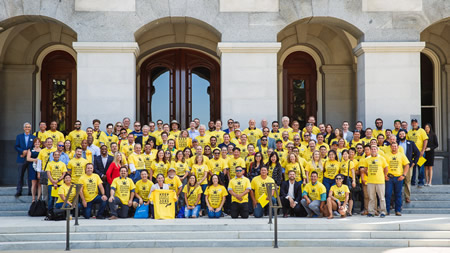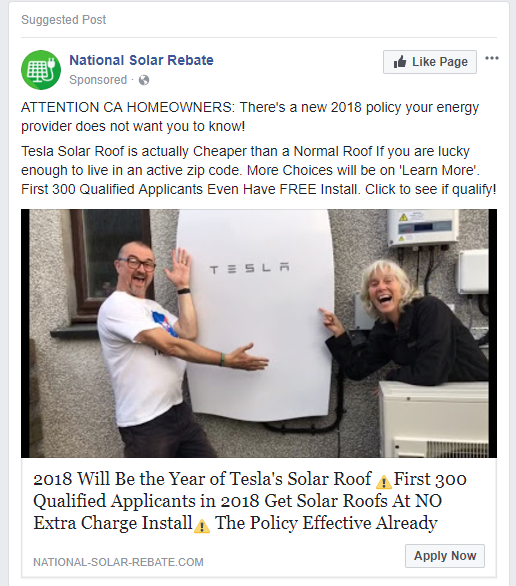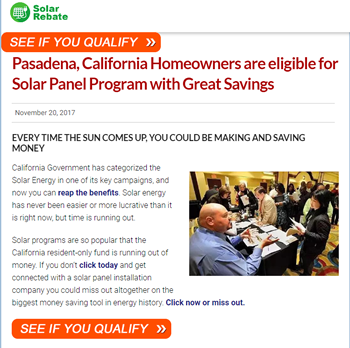Welcome to the
Run on Sun Monthly Newsletter

In this Issue: |
November, 2017
Volume: 8 Issue: 11
Solar Policy Progress!We wrote a post in our blog explaining that securing sustainable solar policy is not a spectator sport, that it requires all of us to roll up our sleeves and do the work needed. Leading that charge here in California are our friends over at CALSEIA, and I think it is helpful to motivate others to join in when they can see positive results.
After all, winning begets winning (well, ok, maybe it didn't in Game 7, but wait 'til next year!), and recently CALSEIA published a list of policy victories this year that I thought you would like to see. So check it out, so much winning! AB 1070 - Lorena Gonzalez Fletcher (D-San Diego)Currently solar installers decide what information they will provide to potential clients, and it varies all over the lot, with many companies simply providing "generic" solar system quotes (i.e., this will be a 4.5 kW system for $4.50/Watt). On the other end of the continuum are the quotes that we provide, calling out all of the equipment we propose to use, how much each line item will cost, a detailed analysis of your savings (using Energy Toolbase, the most sophisticated tool available) and payback over time. We disclose all of our assumptions (such as energy costs increasing by 3%/year), and lay it all out in a clear and easy to follow format. AB 1070 will drag some of those less forthcoming companies into the light. From the legislative counsel's digest:
This is something we have been advocating for a long time. Hopefully the CSLB and the CPUC will craft an easy-to-understand document that will help consumers make meaningful comparisons between competing quotes. We are also pleased that this requires the contract language to track the language of the sales presentation and marketing materials - which in many cases they do not. On top of that is the requirement for the CSLB and the CPUC to document complaints against solar contractors and to publicize those complaints on their website for all to see. This bill won't solve the problem of shady solar contractors, but it is a giant step in the right direction. AB 1414 - Laura Friedman (D-Glendale)It used to be that local jurisdictions could charge whatever they liked for solar permits, and getting those permits could take weeks, even for the smallest resi-install. That was changed a few years ago and permit fees for small PV systems were capped at $500, although realistically, they are supposed to be limited to the actual cost of providing the service. Some jurisdictions have done a lot to live up to the spirit of the requirement, and both the City of Los Angeles and LA County now have very reasonable permit fees. Other jurisdictions, however, magically charge that $500 maximum no matter what. Funny about that. The cap on those fees was due to expire come January 1, 2018, but AB 1414 extends the cap for seven more years, and lowers the cap from $500 to $450, and extends the cap for both ground-mounted systems as well as solar thermal systems. Big win. Other WinsSome other victories include:
Collectively these measures strengthen the solar industry in California, while providing important consumer protections. CALSEIA's work - and that of its members - was key in achieving these results. But there's lots left to do - CALSEIA's legislative analysis list has many "Failed" entries on it where vital measures were either stalled or defeated outright. So get involved - this is not a spectator sport! |
“CALSEIA's work - and that of its members - was key in achieving these results…”
Get your copy of
Commercial Solar:
Step-by-Step
from
Run on Sun
Founder & CEO
Jim Jenal

Now available on Amazon.com
in both
Print & Kindle versions.
Bonus - Buy the Print version…
Get the
Kindle version for Free!
Commercial Solar:
Step-by-Step
from Run on Sun
Founder & CEO
Jim Jenal

Now available on Amazon.com
in both Print & Kindle versions.
Get the Kindle version for Free!
Help Us Spread the News!


We use Angie's List to assess whether we're doing a good job keeping valued clients happy. Please visit AngiesList.com in order to grade our quality of work and client service.
How NOT to Advertise for SolarWe see lots of ads for solar companies - most banal, some clever, some downright fraudulent. Sadly, it is the last of those three that concerns us today. Not a day goes by that someone doesn't try to get us to sign on to their lead generation campaign, and we tell them we don't buy leads. Here's why... Consider this ad that we came across on Facebook:
Well, who doesn't love free? Boy, I wonder if I can qualify? Let's click and see... They harvest your contact information and sell it to solar companies who purchase scammy leads like this. And then your phone will start ringing, from both real people and robocallers, trying to convince you to buy solar from a company whose ethics are so sketchy that they agree to do business with these folks. If you are thinking about going solar, please avoid traps like these. They are plenty of real, honest, local solar companies that would love to help and not rip you off. And hey, if you are reading this, you've already found one! |
Preview of Coming Attractions…We are very close to a major new product announcement, and we are really excited about it. So excited that we are taking December 1st off to attend a hands-on training behind the Orange Curtain. Assuming all goes as planned, we expect to start taking reservations in mid-December with installations to begin in 1Q18! This is something that many of our clients have been asking about, and we are eager to tell you all about it! Watch this space… |



